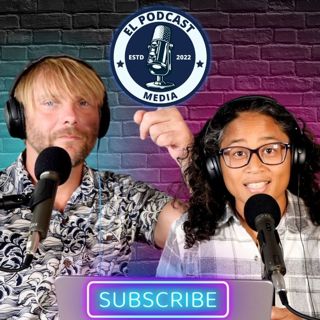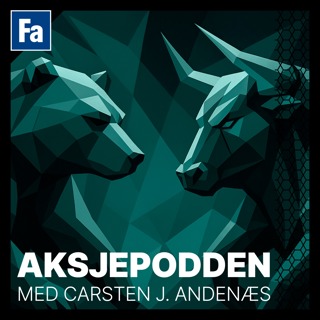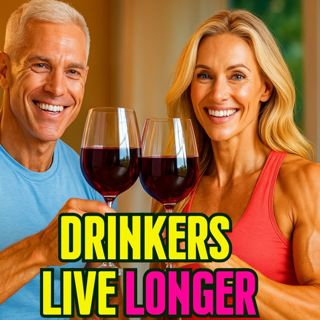
E141: Alcohol Is Good for You – And Science Backs It
Tony Edwards, author of The Good News About Booze, argues that moderate alcohol consumption—especially wine—offers significant health benefits that public health authorities deliberately downplay.Guest Bio:Tony Edwards is a medical research journalist and author of The Good News About Booze and The Very Good News About Wine. A self-described "research nerd," he draws from hundreds of peer-reviewed studies to argue that moderate alcohol consumption—especially red wine—has significant health benefits, including reduced risk of heart disease, dementia, and arthritis.Topics Discussed:The “J-curve” relationship between alcohol and health outcomesWHO’s anti-alcohol messaging and comparisons to tobaccoObesity, processed food, and deflection from real public health issuesAlcohol’s impact on the liver, heart, cholesterol, and weightWine vs. beer vs. spirits: What’s healthiest?Alcohol and the microbiome (“second brain”)Historical and social roots of alcohol demonizationAlcohol’s role in aging, community, and social bondingPublishing censorship around “positive” alcohol scienceMain Points:Moderate drinking is associated with better health outcomes than abstaining, especially regarding cardiovascular disease, dementia, and longevity.Health authorities suppress or ignore nuanced evidence, promoting a binary “alcohol is poison” message similar to tobacco fear campaigns.Red wine is particularly beneficial due to its high polyphenol content and synergistic effects with alcohol.Social drinking strengthens community bonds and psychological well-being through endorphin activation and routine social rituals.The real health threats—processed foods, pharmaceutical overuse, and poor lifestyle habits—are often overshadowed by anti-alcohol messaging.3 Best Quotes:“Alcohol is actually good for your health—up to a certain level. It’s a paradoxical substance.”“You will die five years earlier if you drink nothing but water compared to people who drink wine.”“They won’t tell you the truth because they think people are too stupid to understand that a little of something is good for you—and a lot is not.” 🎙 The Pod is hosted by Jesse Wright💬 For guest suggestions, questions, or media inquiries, reach out at https://elpodcast.media/📬 Never miss an episode – subscribe and follow wherever you get your podcasts.⭐️ If you enjoyed this episode, please rate and review the show. It helps others find us. Thanks for listening!
1 Jul 54min
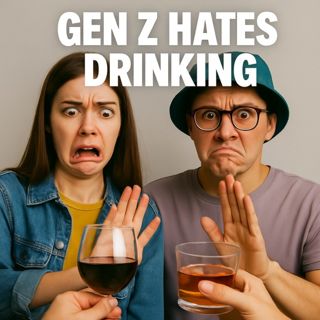
E140: Gen Z’s New Lifestyle: Healthier or Just Lonelier?
Marketing executive and business lecturer Melise Panetta breaks down why Gen Z is drinking less alcohol—and what that means for wellness culture, social life, and the future of consumer marketing.👤 Guest Bio:Melise Panetta is a seasoned business executive with over 20 years of experience at major firms like PepsiCo and General Mills. She is currently a marketing lecturer at the Lazaridis School of Business and Economics at Wilfrid Laurier University in Ontario, Canada, with deep expertise in wellness trends, consumer behavior, and brand strategy.🧭 Topics Discussed:Why Gen Z is drinking less alcohol than previous generationsThe impact of social media, wellness culture, and DUIsSubstitutes for alcohol: marijuana, vaping, microdosingThe rise of “low and no” alcohol beveragesMarketing missteps (e.g. Bud Light/Dylan Mulvaney) and lessonsThe generational shift in social behavior and its business implicationsThe future of alcohol, soda, and wellness brandingAI in marketing: threat or tool?Broader trends in consumer psychology, brand trust, and authenticityShortcuts vs. sustainability in weight loss and lifestyle changes💡 Main Points:Gen Z’s reduced alcohol consumption is tied to wellness values, mental health awareness, and economic constraints.The generation’s delayed adultification—living at home longer, dating less, socializing less—shapes consumption habits.Brands must adapt by offering “low/no” alcohol options, emphasizing functional benefits, and targeting women and minorities with distinct campaigns.Social drinking is being replaced by health rituals, gym culture, and digital interaction, contributing to loneliness.AI will reshape marketing by assisting with research and content creation, but human insight remains critical.📌 Three Best Quotes:“This isn’t a fad—it’s rooted in a decades-long wellness trend that’s only gaining momentum.”“Gen Z isn’t putting alcohol at the center of their social life anymore. And that changes everything for marketers.”“If you don’t drink alcohol because it controls you, and you also can’t drink it because you’re scared of it—then it still controls you.” 🎙 The Pod is hosted by Jesse Wright💬 For guest suggestions, questions, or media inquiries, reach out at https://elpodcast.media/📬 Never miss an episode – subscribe and follow wherever you get your podcasts.⭐️ If you enjoyed this episode, please rate and review the show. It helps others find us. Thanks for listening!
24 Jun 1h 32min

E139: ChatGPT Cheating Crisis Explained
Graham Hillard reflects on how AI (especially ChatGPT) is reshaping teaching, learning, and the future viability of higher education and related careers.Guest bio:Graham Hillard is a writer and former university English professor with 15 years of teaching at a liberal arts college in Nashville. He now serves as an editor at the James G. Martin Center for Academic Renewal and contributes to the Washington Examiner, focusing on higher education policy and cultural commentary.Topics discussed:Detection and dynamics of AI-assisted cheating in student workProfessors’ ability (and limits) to identify AI-generated proseInstitutional responses: from forbidding tools like Grammarly to blue-book handwritten examsThe changing value of credentials versus genuine learningThe economic sustainability of universities amid credential inflation and AI-driven skill parityOnline teaching during and after the pandemic, and its impact on learning qualityAI’s broader hype versus realistic technological progress, including medical and labor implicationsFuture career advice in an AI-augmented world: trades, human services, and unknown new fieldsThe role of regulation and government in preserving work and shaping educational demandHigher ed’s internal contradictions: tenure, adjunct exploitation, large endowments, and political perceptionsMain points:AI tools create an “arms race”: savvy students can evade detection, while professors can often sense AI-generated text but struggle to prove it.Widespread AI use threatens to blur the line between college graduates and non-graduates, undermining credential value and potentially the economic model of many institutions.Some traditional fixes (e.g., handwritten exams) may work briefly but are ultimately unsustainable as technology (wearables, implants) advances.Online teaching offers convenience but poses systemic hurdles to genuine learning due to asynchronous formats and loss of spontaneous interaction.AI hype often outpaces real innovation; many promised breakthroughs (e.g., new drugs, robot plumbers) face long timelines and practical constraints.Human roles in creative, critical, and certain service areas (nursing, veterinary care, regulation, oversight) remain essential, at least for the foreseeable future.Regulatory and political forces may slow or reshape disruption, but broken structures in higher ed (tenure imbalances, rising tuition, administrative bloat) leave it vulnerable to reform or contraction.Institutions once seen as unimpeachable (e.g., elite universities with massive endowments) face growing public skepticism and potential taxation pressures.Despite skepticism, many still plan to send their children to college, reflecting both habit and the current perceived value of the credential “signal.”Ultimately, AI is more nuisance than existential threat today—but its integration demands rethinking education’s purpose, assessment methods, and alignment with evolving career landscapes.Top 3 quotes:“I would say that ChatGPT is doing better work than the stupid student, but worse work than the smart student.”“If college only indicates mastery of ChatGPT, I can assure all of our listeners that other cheaper means of demonstrating that mastery will arise. And then what’s the point of colleges?”“I persist in saying that this AI stuff is probably hyped overblown a little bit, but man, if any institution, if any sector of the economy is gearing up to be experiencing some pain, it’s higher education.” 🎙 The Pod is hosted by Jesse Wright💬 For guest suggestions, questions, or media inquiries, reach out at https://elpodcast.media/📬 Never miss an episode – subscribe and follow wherever you get your podcasts.⭐️ If you enjoyed this episode, please rate and review the show. It helps others find us. Thanks for listening!
17 Jun 1h 21min

E138: Hidden Rules of Ownership Explained
A deep dive into Michael Heller & James Salzman’s Mine, exploring how modern “ownership engineering” shapes innovation, resource access, and societal outcomes.Guest BiosMichael Heller: Vice Dean & Professor of Real Estate Law at Columbia Law School; economist and property theorist; author of Mine: How the Hidden Rules of Ownership Control Our Lives; former World Bank advisor on post-communist property reforms.James Salzman: Professor of Environmental Law at UCLA & UC Santa Barbara; expert in resource management and property law; co-author of Mine; taught at Duke Law and advised on water policy and environmental regulation.Topics DiscussedOwnership gridlock in pharmaceuticals and biotech patentsCopyright fragmentation (MLK speeches, music sampling)“Remote control” of behavior via ticketing (Duke basketball “camp-out”)Property conflicts: solar panels vs. redwood trees, adverse possession casesDigital ownership: AI training data, EV feature subscriptions, Amazon cart analogyHistorical and international property transitions (post-Soviet housing reforms)Jurisdictional experiments in ownership law (state labs, South Dakota trusts, Puerto Rico tax incentives)Three Main PointsOwnership Engineering: Rights aren’t natural—they’re designed tools (“remote controls”) wielded to steer behavior, from seating fans to shaping markets.Gridlock & Fragmentation: Excessive, overly granular property rights (patents, copyrights) can stifle innovation and access—too many owners, too few outcomes.Digital vs. Physical Property: The shift to “ones and zeros” erodes traditional possession; corporations gain power to add or remove features, while users overestimate what they truly own.Top Three Quotes“Possession plus time equals ownership—may not be just or moral, but it certainly is powerful.”“Savvy companies think of their ownership as a remote control: they press buttons to steer you without you even realizing it.”“In a world of ones and zeros, what you feel you own is often one-tenth of what you actually own—Amazon and Tesla already know this.” 🎙 The Pod is hosted by Jesse Wright💬 For guest suggestions, questions, or media inquiries, reach out at https://elpodcast.media/📬 Never miss an episode – subscribe and follow wherever you get your podcasts.⭐️ If you enjoyed this episode, please rate and review the show. It helps others find us. Thanks for listening!
10 Jun 57min

E137: Buy, Borrow, Die: Build Wealth Using Other People's Money
In this episode, Mark Quann, founder of the Perfect Portfolio, discusses his "Buy, Borrow, Die" strategy for building wealth, legally avoiding taxes, and achieving financial independence.Guest Bio:Mark Quann is the founder of the Perfect Portfolio, a tax strategist, and the author of Top 10 Ways to Avoid Taxes and Be Smart, Pay Zero Taxes. With a background in finance and business, Mark teaches everyday people how to use the Buy, Borrow, Die strategy to grow their wealth while minimizing taxes.Topics Discussed:The Buy, Borrow, Die strategy for building wealth and avoiding taxes.Real estate as a wealth-building tool and its tax advantages.Strategies for using margin and borrowing against assets to finance investments.The importance of financial education and raising your financial IQ.The limitations of traditional retirement accounts and their tax implications.5 Main Points:The Buy, Borrow, Die strategy allows individuals to build wealth without selling assets or paying taxes, leveraging borrowed money to acquire more assets.Real estate offers tax advantages like accelerated depreciation and income generation through rent, while keeping taxes low.Financial advisors and traditional retirement accounts are not the best way to build wealth; they often lead to high taxes and minimal returns.Anyone can start with small investments, such as $100, and scale up by borrowing against assets to continue buying and growing wealth.Understanding the rules of the financial game, such as the Buy, Borrow, Die strategy, is key to financial independence.Best 3 Quotes:"The rich get rich with inflation. The poor get poor. Inflation transfers the wealth from the poorest people on the planet to Wall Street and the people who understand Buy, Borrow, Die.""If you really want to be financially free, you need to stop doing what everyone else is doing. Start with a brokerage account, invest in assets, and borrow against them.""The system is rigged. If you don't use the strategies that the billionaires use, you’re the one who’s working until you die. The game is there to be played." 🎙 The Pod is hosted by Jesse Wright💬 For guest suggestions, questions, or media inquiries, reach out at https://elpodcast.media/📬 Never miss an episode – subscribe and follow wherever you get your podcasts.⭐️ If you enjoyed this episode, please rate and review the show. It helps others find us. Thanks for listening!
6 Jun 1h 6min
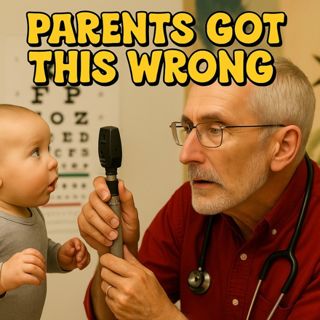
E136: Pediatrician Explains How to Raise Healthy Kids in our Modern World
Dr. Paul Turke, a pediatrician and anthropologist, discusses his book Bringing Up Baby, exploring evolutionary insights on child health, grandparent roles, and the social aspects of aging, with a focus on how early life and kinship networks impact development.Guest Bio:Dr. Paul Turke is a pediatrician and anthropologist with expertise in child development, evolutionary health, and pediatrics. He is the author of Bringing Up Baby, which explores child health through an evolutionary lens, with a particular focus on grandparent involvement, autism, and mental well-being.Topics Discussed:The evolutionary role of grandparents in human lifespan and healthAutism and the potential link to vision disorders in infantsThe importance of exercise and purpose in preventing anxiety and depressionThe influence of kinship networks on parenting in modern societyThe impact of diet and exercise on aging and long-term healthThe role of parents and grandparents in child developmentKey Points:Grandparents are evolutionary assets, contributing to human longevity through indirect reproduction and support of grandchildren, helping to maintain strong natural selection.Autism may be linked to vision issues in infants, where early correction of visual impairments could potentially reduce the risk of developmental disorders.Anxiety is an evolved guidance system, and mental well-being can be better supported by exercise, outdoor activities, and social engagement rather than relying solely on medication.Top 3 Quotes:"Live long and be helpful""Anxiety serves a purpose. We need to learn how to deal with it, not eliminate it.""The planet will benefit if our children are the ones who solve the problems of the future." 🎙 The Pod is hosted by Jesse Wright💬 For guest suggestions, questions, or media inquiries, reach out at https://elpodcast.media/📬 Never miss an episode – subscribe and follow wherever you get your podcasts.⭐️ If you enjoyed this episode, please rate and review the show. It helps others find us. Thanks for listening!
3 Jun 58min
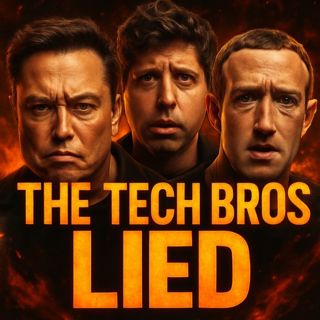
E135: Tech Bubble About to Burst - Dr. Jeffrey Funk Explains Why
Dr. Jeffrey Funk discusses his book Unicorns, Hype, and Bubbles, offering critical insights on the current tech bubble, the limitations of AI, and the dangers of overhyped investments in today's startup culture.Guest Bio:Dr. Jeffrey Funk is a technology consultant, engineer, and retired professor with experience in academia and industry across the U.S., Singapore, and Japan. He holds a Ph.D. from Carnegie Mellon University and has been involved in the tech sector for decades, teaching courses on economics and new technologies.Topics Discussed:The AI bubble and its financial implicationsThe challenges of AI adoption and revenue generationThe reality of technological advancements and the lack of substantial innovationThe evolving startup ecosystem and the rise of hype-driven investmentsThe impact of low fertility rates on technological growthThe flaws of modern education and the need for real-world context in teachingKey Takeaways:AI is overvalued with low revenues.Technological progress today is less impactful than in the past.Startups focus on hype over profitability.Many tech metrics are misleading.Generative AI's impact is slower than expected.90% of unicorns remain unprofitable after 10 years.The economy is driven by hype, not real progress.Investors are swayed by narratives, not business models.Education needs practical skills and critical thinking.Student debt remains a significant burden.Declining fertility rates challenge economic growth.Technology hype often overshadows practical impact. 🎙 The Pod is hosted by Jesse Wright💬 For guest suggestions, questions, or media inquiries, reach out at https://elpodcast.media/📬 Never miss an episode – subscribe and follow wherever you get your podcasts.⭐️ If you enjoyed this episode, please rate and review the show. It helps others find us. Thanks for listening!
30 Mai 1h 10min

E134: Bad HOA: Fighting Back Against Evil Homeowner Associations w/ Attorney Luke Carlson
Luke S. Carlson, founder of LS Carlson Law, discusses his book Bad HOA and shares insights into common issues homeowners face with HOAs, including how to reclaim power from abusive boards.Guest Bio:Luke S. Carlson, Esq. is the founder of LS Carlson Law, specializing in helping homeowners fight against HOA abuse. With over 17 years of experience, Luke provides strategic legal advice in business, real estate, and estate planning, and is the author of Bad HOA: The Homeowner’s Guide to Going to War and Reclaiming Your Power.Topics Discussed:Types of problematic HOA board members (the tyrant, meddler, fool, and self-dealer)The benefits and challenges of living in an HOAHow homeowners can assert their rights and fight back against HOA abuseThe role of financial mismanagement and inadequate reserves in HOA dysfunctionHow homeowners can proactively avoid bad HOA situations when buying propertyCommon legal issues homeowners face with HOAs in California and FloridaTop Quotes:"Sometimes you have to declare war to secure peace.""If you get the right people on the board, HOAs can provide a lot of value, but when you don't, it leads to chaos."📺Watch the full pod on YouTube➡️https://youtu.be/pKOhFRUKODk 🎙 The Pod is hosted by Jesse Wright💬 For guest suggestions, questions, or media inquiries, reach out at https://elpodcast.media/📬 Never miss an episode – subscribe and follow wherever you get your podcasts.⭐️ If you enjoyed this episode, please rate and review the show. It helps others find us. Thanks for listening!
27 Mai 53min
